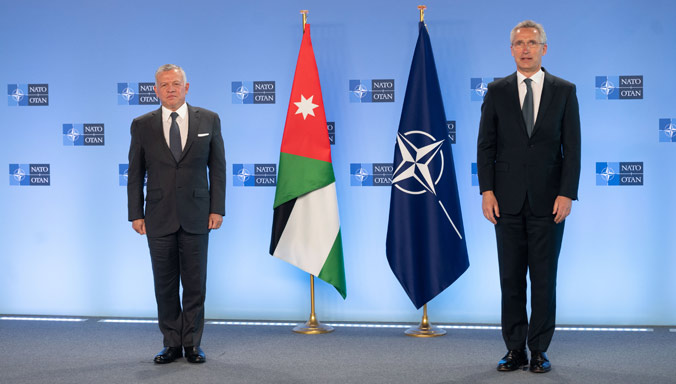NATO Secretary General Jens Stoltenberg and Jordan’s King Abdullah II met at the military bloc’s headquarters in Brussels on May 5.
Stoltenberg congratulated Abdullah on the hundredth anniversary of the Hashemite Kingdom of Jordan. There’s a greater affinity than might immediately meet the eye, as seven of NATO’s twelve founding members were and remain constitutional monarchies as well: Belgium, Britain, Canada, Denmark, Luxembourg, the Netherlands and Norway.

The NATO chief also praised the Middle Eastern monarchy as “a very close and important partner of NATO.” He further provided a short list of Jordan’s contributions to NATO’s wars and post-war occupations around the world: “Our forces have served together side by side in the Balkans, in Afghanistan, over Libya, and Jordanian troops also participate in the NATO Response Force.” Jordanian troops served under NATO in Bosnia after the bloc bombed Serbian belligerents there (only Serbian forces) into submission and in Kosovo after NATO’s 78-day air war against Yugoslavia transferred Kosovo from Yugoslav control to that of NATO and the so-called Kosovo Liberation Army.
In 2011 six Royal Jordanian Air Force fighter jets were deployed to a European air base for NATO’s seven-month air war against Libya.
Stoltenberg also thanked the king for Jordan’s role in the NATO Training Mission – Iraq and NATO Training Mission-Afghanistan, used to transform the armed forces of both nations to meet NATO interoperability standards. (Since 2012 both countries have been members of NATO’s Partners Across the Globe.)
NATO and Jordan are also marking another anniversary: 27 years since the kingdom joined NATO’s Mediterranean Dialogue military partnership with fellow Middle East/North Africa nations Algeria, Egypt, Israel, Mauritania, Morocco and Tunisia: every North African country except for Libya, which discovered a decade ago the price of remaining outside the NATO military orbit.
In 2009 Jordan signed an Individual Cooperation Programme with NATO in the framework of the More Ambitious and Expanded Framework for the Mediterranean Dialogue initiative of 2004.
In 2012 the Jordan Armed Forces Peacekeeping Operations Training Centre and the Jordan Language Institute were incorporated into the network of 33 NATO Training and Education Centres.
The Middle Eastern nation is also a member of NATO’s Science for Peace and Security program. (Don’t let the name fool you.)
In 2018 NATO and Jordan expanded cooperation with the NATO-Jordan Defense Capacity Building Project (DCB).
The year before Jordan, which since 1996 has been a Major non-NATO Ally of the U.S., was the beneficiary of $143 million of Pentagon funds to upgrade the strategic Muwaffaq Salti Air Base near its borders with Iraq and Syria. That was more than for any other overseas Air Force operational site. ($153 million of a total of $500 million.) The base had been used extensively by NATO (including fighter-bombers from nations like Belgium and the Netherlands) as well as the Pentagon for strikes in the region.
Jordan is ideally located for NATO’s expansion to the global east and south.
Rick Rozoff is a contributing editor at Antiwar.com. He has been involved in anti-war and anti-interventionist work in various capacities for forty years. He lives in Chicago, Illinois. He is the manager of Stop NATO. This originally appeared at Anti-Bellum.


